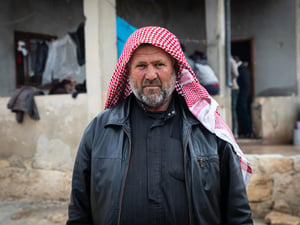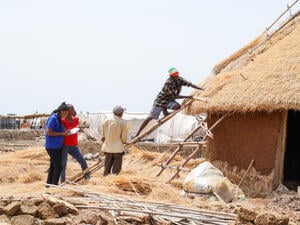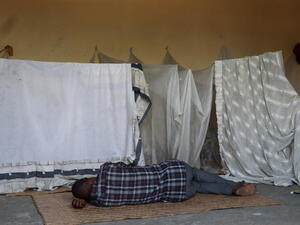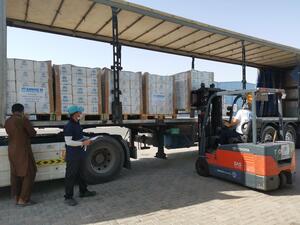UNHCR steps up shelter programme in eastern Ukraine
UNHCR steps up shelter programme in eastern Ukraine
For the first time in five months, UNHCR convoys have reached conflict-affected populations in the non-government controlled area of Luhansk region in eastern Ukraine, delivering vitally needed construction materials for thousands of people who had their homes damaged or destroyed during the conflict.
Two separate convoys of 25 trucks each travelled with support from the World Food Programme (WFP) and local partners to deliver supplies that will enable UNHCR to expand its shelter programme in the region. The first 25 trucks arrived on Thursday and delivered 23,000 roofing sheets to the UNHCR warehouse in Luhansk.
Another 25 trucks arrived today (Friday) with cement, bricks, roofing material, tarpaulins and nails as well as kitchen sets, jerry cans and shoe dryers for use in winter.
Despite the ceasefire agreed in 2015, the security situation in eastern Ukraine remains tense and volatile. Flare-ups of hostilities continue to lead to daily casualties among civilians and the destruction of homes. UNHCR estimates that some 10,000 houses in non-government controlled areas of Luhansk have been damaged as a result of the conflict.
Since the onset of the conflict in 2014, more than 2 million people have been forced to flee their homes to seek sanctuary elsewhere in the country or abroad. Nearly 800,000, including the elderly and others in the most vulnerable categories, remain in need of assistance in or close to the conflict zone.
Many homes damaged by shell and mortar fire had their windows and roofs blown off. During an assessment mission to Luhansk in May, UNHCR officials met 77-year-old former construction worker Petro and his wife. They had lived in a tiny basement room – the only part of their shelled home that protected them from snow, rain and wind – for more than two years.
UNHCR remains extremely concerned about restrictions on freedom of movement that have aggravated hardships for people like Petro, who must also struggle to have access to benefits and entitlements – including pensions – on the government-controlled side.
A major problem is the limited number of checkpoints to cross the front line. In the Luhansk region, only one pedestrian checkpoint in Stanitsa Luhanskaya remains open, with people queuing up to eight hours to cross. Long lines of 200-400 cars were observed this week at checkpoints in the Donetsk region.
The payment of social benefits and pensions to Internally Displaced Persons has been suspended until their residential addresses have been verified. This is a major challenge, especially for the elderly, people with disabilities and other individuals with specific needs who face insecurity while waiting for long hours at check points without shelter or adequate sanitation. UNHCR renews its call to all actors to guarantee unrestricted access to benefits and rights to all displaced persons, regardless of registration status or current place of residence.
The delivery of humanitarian assistance has decreased to non-government controlled areas in the Luhansk region, as many UN agencies have not been able to operate there since February 2015.
This year the UNHCR team in Luhansk, working with a local construction company and volunteers, and in coordination with local village administrators, plans to complete the rehabilitation of 1,500 damaged houses by October 2016, in addition to 1,500 households repaired in 2015. About 1,100 families in 15 villages located close to the dividing line have already received construction materials, but 40 per cent of the targeted population will not be able to complete shelter works without UNHCR’s support.
For more information on this topic, please contact:
- In Ukraine, Nina Sorokopud, [email protected], +380 50 310 1767
- In Geneva, William Spindler, [email protected], +41 79 217 3011
- In Geneva, John Chiahemen, [email protected], +41 79 513 9549








